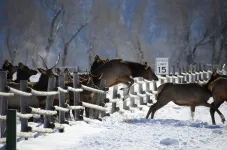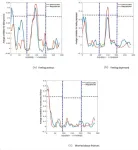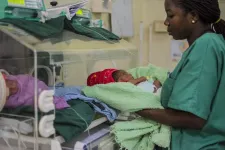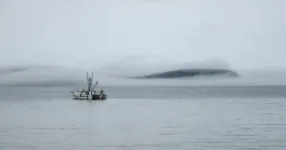(Press-News.org) Reduced traffic and human mobility during the 2020 COVID-19 lockdown restrictions rapidly altered some mammals’ movement behaviors, according to a new study. The findings illustrate how human activities constrain animal movement and how they react when those activities cease, which provides valuable insight into future conservation strategies designed to improve human-wildlife coexistence. During the initial global outbreak of COVID-19 in 2020, governments worldwide introduced lockdown measures to curb the spread of the virus, resulting in a drastic reduction in human mobility and vehicular traffic. This “anthropause,” as it’s come to be known, has provided a unique opportunity to quantify the effects of human activity on wildlife behaviors. Human roadways and the need for animals to cross them is important to the conservation of many species. Not only do they reduce habitat and limit the movement and population dispersal for many species, but vehicle collisions can also be a notable source of animal mortality. Despite this, relatively little is known about the impact of roads on animal behavior across species and at global scales. Leveraging the natural experiment afforded by COVID-19 lockdowns, Marlee Tucker and colleagues compiled GPS tracking data from 76 studies – a dataset that encompassed 2300 individual mammals, representing 43 species from around the world – and evaluated how they changed their behaviors during the initial 2020 lockdown period (February 1 – April 28, 2020) compared with the same period in 2019. Although individual movement and road avoidance behavior responses to lockdowns varied across species and regions globally, Tucker et al. revealed several consistent effects. According to the findings, in locations where COVID-19 lockdown policies were stricter, animals traveled on average 73% farther during the lockdown period than the previous year, suggesting that most animals in these locations were exploring more of the landscape when vehicle movement was reduced. Additionally, the analysis revealed that length of short-distance mammal movements in populated human areas was reduced, and individuals traveled 36% closer to roadways during lockdowns. Tucker et al. suggest that this is because animals were less fearful of the road traffic or human presence in these regions and exhibited shorter fleeing distances as a result. “Tucker et al. provided a comprehensive answer about the ability of some animals to make use of human-inhabited areas and even expand their habitats when human activity declines,” write Colleen Cassady St. Clair and Sage Raymond in a related Perspective. “Their results highlight the environmental impact of vehicle activity, which is discussed less often publicly than the effects of emissions, permanent road infrastructure, and habitat loss.”
END
2020’s COVID-19 lockdowns altered mammal movements worldwide
2023-06-08
ELSE PRESS RELEASES FROM THIS DATE:
Some intestinal T cells can hinder cancer immunotherapy, while others can enhance it, finds a new pair of studies
2023-06-08
Two new studies in Science and Science Immunology spotlight a group of intestinal T cells with α4β7 integrin receptors that could be targeted to prevent resistance to immune checkpoint blockade (ICB) cancer immunotherapy. Both studies were conducted in mice and corroborated in samples from patients.
In the Science study, Marine Fidelle and colleagues evaluated how interactions between antibiotics, the gut microbiome, and α4β7+ CD4+ T cells promote ...
Climate underlies African forest and savanna biomes
2023-06-08
Coupled field observations and phytoclimatic modeling show that the distribution of African forest and savanna ecosystems are highly predictable by climate, researchers report in a new study. The findings suggest that the effects of climate change on the distribution of African forests and savanna may be more easily forecasted than previously recognized. An important yet challenging goal for ecological science is predicting how global vegetation patterns will be altered by ongoing climate change. Generally, the distribution of Earth’s vegetation biomes is determined by climate. However, at local or regional ...
Wild mammals moved farther during severe COVID-19 lockdowns
2023-06-08
Tucker and 174 colleagues, including members of the COVID-19 Bio-Logging Initiative, analysed global data from land mammals tracked by GPS devices. Tucker: “There were many media reports that nature was recovering during those first lockdowns. For example, cougars were roaming the streets of Santiago, Chile, but we wanted to know: is there any evidence of this? Or were people simply paying more attention to everything while being at home?”
Movements of mammals
Tucker and colleagues collated ...
Study: Southern states may have borne brunt of COVID-19 mental health impact
2023-06-08
LAWRENCE — A new study appearing today in the peer-reviewed journal PLOS ONE shows how federal and state lockdowns and health mandates implemented to curb the spread of COVID-19 affected the mental health of people living in four U.S. geographic regions and affiliated with two major political parties.
A group of faculty, staff and student researchers at the University of Kansas generated data-based maps to look for spatial trends and communities with similar mental health and COVID-19 outcomes. ...
Researchers find an immune system ‘trip wire’ that detects COVID-19
2023-06-08
Inflammasomes make up an intricate system of molecular sensors that our bodies use to sound an alarm when an infection occurs. However, the mechanisms behind these sensors, which initiate responses to threats such as invading pathogens, and how they operate has been an area of intrigue for immunologists.
In a new study, University of California San Diego biologists describe a previously unknown way that the immune system detects certain viruses. The inflammasome immune protein known as CARD8, they found, can serve as a trip wire to detect a range of viruses, including SARS-Cov-2, which causes COVID-19.
Adding ...
Without fully implementing net-zero pledges, the world will miss climate goals
2023-06-08
Without more legally binding and well-planned net-zero policies, the world is highly likely to miss key climate targets.
In the new study, led by Imperial College London and published today in Science, researchers ranked 90% of global net-zero greenhouse gas emissions pledges as providing low confidence in their full implementation.
The researchers recommend nations make their targets legally binding and back them up with long-term plans and short-term implementation policies to increase the likelihood of avoiding ...
Breakthrough: Scientists develop artificial molecules that behave like real ones
2023-06-08
Scientists from the Radboud University have developed synthetic molecules that resemble real organic molecules. A collaboration of researchers, led by Alex Khajetoorians and Daniel Wegner, can now simulate the behaviour of real molecules by using artificial molecules. In this way, they can tweak properties of molecules in ways that are normally difficult or unrealistic, and they can understand much better how molecules change.
Emil Sierda, who was in charge of conducting the experiments at Radboud University: ‘A few years ago we had this crazy idea to build a quantum simulator. We wanted to create artificial ...
Global study highlights deaths from neonatal sepsis and steps to improve treatment
2023-06-08
A global observational study co-led by UCL (University College London), which involved more than 3,200 newborn babies suffering from sepsis in 19 hospitals in 11 countries, has shown that many newborns are dying because the antibiotics used to treat sepsis are losing their effectiveness.
The study, conducted from 2018 to 2020, found there was high mortality among infants with culture-positive sepsis (almost 1 in 5 across the hospital sites), and a significant burden of antibiotic resistance. The study has provided a wealth of high-quality data aimed at improving the treatment of newborn babies with sepsis.
The findings of the observational study ...
Why certain fish are left off the hook
2023-06-08
As warming waters threaten fish populations and disrupt fisheries around the world, it is critical to find ways to sustain fisheries while at the same time allowing those fisheries to remain economically viable to those who depend on them for their livelihoods. In the United States, commercial fishing employs 1.2 million Americans and generates more than $165 billion annually.
The primary way that the United States has protected its fisheries is through the Magnuson-Stevens Act, which was modernized in 1996 to foster the long-term biological and economic sustainability ...
In schools that could benefit most, building relationships is key to increasing capacity for nutrition education programming
2023-06-08
Philadelphia, June 8, 2023 – The US Department of Agriculture Supplemental Nutrition Assistance Program-Education (SNAP-Ed) provides nutrition programming to individuals with low income, including students and their families, through a network of community partners who implement the programs. Findings of a new study in the Journal of Nutrition Education and Behavior, published by Elsevier, suggest SNAP-Ed implementers could develop a school’s readiness for programming by concentrating efforts on cultivating relationships, program-specific capacity, and motivation at schools.
Lead author Erin McCrossan, PhD, Office of ...



